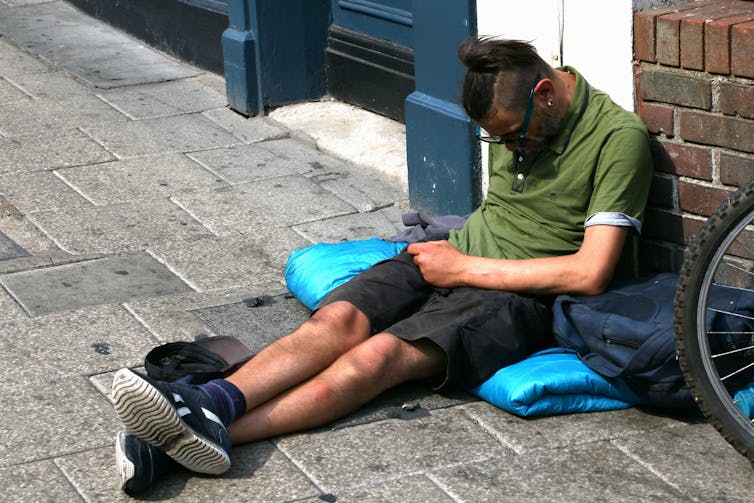About the author: Kristyn Anderson is a PhD (Health) student at Dalhousie University.
The government of Canada has identified populations that are vulnerable to contracting COVID-19.
Canadians at high risk include those with economic barriers, unstable employment, difficulty accessing medical care and who have ongoing supervision needs and unstable housing.
These vulnerabilities are consistent with the outcomes of youth who have been involved in the child welfare system.
Children often enter child welfare systems as a result of abuse or neglect through no fault of their own. Those between the ages of 12 and 18 who commit crimes and “cross over” to the federal youth justice system while still involved in the child welfare system are referred to as crossover youth.
Crossover youth, whose rights are concurrently governed by federal and provincial legislation, urgently need a national strategy that addresses their situation. Since the vision of the federal government’s Youth Policy is for young people to be “equipped to live healthy and fulfilling lives and feel empowered to create positive change for themselves, their communities and the world,” the federal Minister of Youth should ensure that young people raised with the government as their legal guardian have the tools required to fulfil this vision.
More likely to be charged with offences
Canadian research on crossover youth is sparse, with few provinces having publicly available information.
In British Columbia, youth involved with child welfare are seven times more likely to be charged with an offence than their peers who have not been in the child welfare system, and are more likely to be sentenced to custody (10.4 per cent compared to 0.5 per cent of youth not in the child welfare system).
A 2009 report by the British Columbia Representative for Children and Youth found that more youth in the child welfare system crossed over to the justice system (35 per cent) than graduated high school (24 per cent).
Children and youth involved with child welfare are more likely to be marginalized, and what is known as the care-to-custody pipeline requires more attention.
Not surprisingly, and long known by those of us who work with criminalized populations, a recent meta-analysis found that half of all prisoners in Canada experienced abuse in childhood. Provincial, federal, youth — Canadian jails are filled with survivors of trauma.
Crossover youth present with high rates of mental health and substance abuse problems, with American research estimating that 83 per cent live with a concurrent disorder. Furthermore, youth who are experiencing homelessness are 193 times more likely to have a history of child welfare involvement than the general public.

The case for a children’s commissioner
Indigenous child welfare, federal penitentiaries and the Youth Criminal Justice Act fall under federal jurisdiction, so the Minister of Youth should create a federal child and youth advocate — a children’s commissioner — in order to provide crossover youth the opportunity to meet the vision and objectives of Canada’s Youth Policy.
The commissioner would fall under the powers of Parliament, making child welfare a shared power between the federal and provincial governments. Given that outcomes for child welfare are not published, the children’s commissioner would ensure that all provinces and territories are tracking the outcomes of the children and youth they raise and comparing their results nationally.
The children’s commissioner should require all provinces and territories to have an independent child and youth advocate that would work in concert with the federal mandate. This oversight is in the best interests of youth, and consistent with the United Nations Convention of the Rights of a Child, of which Canada is a signatory.
A 2007 report by the Senate Standing Committee on Human Rights called on the government of Canada to improve its compliance with international human rights treaty obligations.
It further called for the creation of an independent commissioner “ … to monitor government implementation of children’s rights at the federal level and liaise with provincial child advocates.”
No ability to affect change
As outlined by the Canadian Council of Child and Youth Advocates (CCCYA), some provinces have an ombudsman, representative or commissioner; some of them are employees of the government, but all lack the ability to bring about systemic change.
While they claim to operate independent of government control, if that were the true, Ontario would not have been able to eliminate the office of their child advocate.
The Nova Scotia College of Social Workers has repeatedly called for the creation of a child and youth advocate without success. Provincial and territorial calls for an independent advocate showcase the importance and need of federal intervention to support all Canadian children who have experienced child welfare involvement.![]()
This article was first published on The Conversation, which features includes relevant and informed articles written by researchers and academics in their areas of expertise and edited by experienced journalists.
Dalhousie University is a founding partner of The Conversation Canada, an online media outlet providing independent, high-quality explanatory journalism. Originally established in Australia in 2011, it has had more than 85 commissioning editors and 30,000-plus academics register as contributors. A full list of articles written by Dalhousie academics can be found on the Conversation Canada website.

